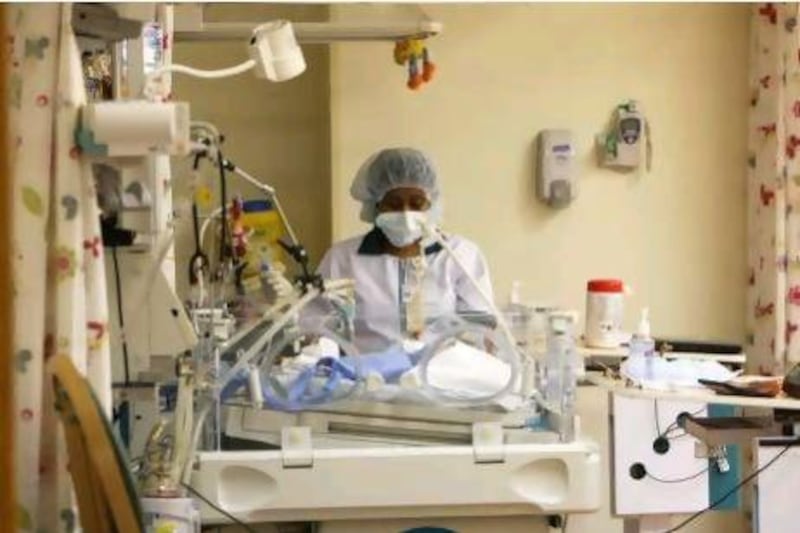Hospitals need more neonatal facilities to cope with the demands of delivering and caring for sick babies, experts say.
Abu Dhabi alone requires more than 100 extra neonatal intensive care unit (NICU) beds on top of those recently added at hospitals in Abu Dhabi city and Al Ain, said Dr Junaid Muhib Khan, the chief of Al Rahba Hospital's NICU.
"We calculated the figure and about 106 NICU beds are needed, which is a lot," said Dr Khan. "This is only in Abu Dhabi, so you can imagine the need for special care elsewhere."
The problem was highlighted last week after a Filipino couple's two-day-old son died of complications at the Canadian Specialist Hospital in Dubai after being turned away from several other facilities.
On a Facebook page dedicated to Alex Gabriel, who died after being born five weeks premature, his father, Nolly P Rizo Jose, wrote that he and his wife were moved on from several hospitals, one of which said it was at capacity.
The problem extends past the number of NICUs available, with a lack of specialised nurses and neonatologists also to blame.
The most up-to-date statistics available from the Health Authority Abu Dhabi (Haad), from 2010, showed there were just 13 neonatal doctors working in seven facilities in the emirate.
"The reasons are obvious. First of all, the population is increasing. Secondly, new communities are being built," said Dr Khan.
To address the issue, Mafraq Hospital and Al Rahba Hospital, both public hospitals in Abu Dhabi, this year announced the expansion of their NICUs.
Al Rahba is now operational, while Mafraq's expansion will be complete by the spring.
Both will offer 29 additional beds beside those already in use.
Similarly, Dubai's Latifa Hospital - previously Al Wasl - will add 18 more beds.
Referrals from private hospitals have meant an increased strain on government-run facilities, said Dr Taisser Atrak, the chief of neonatology at Mafraq Hospital.
"We need extra beds. We have tried to accept everyone but we cannot," he added.
To accommodate as many emergency cases as possible, the hospital occasionally moves babies in a stable condition to the paediatric wards.
At Al Qassimi Hospital in Sharjah, the shortage of beds and staff is further strained by referrals from private hospitals, said Dr Arif Al Nourian, a cardiology consultant and the CEO.
"We have 12 NICU beds but we need at least double that number," he said.
A new women's and children's hospital is also due to open in Sharjah this summer. Further details were not available but Dr Al Nourian said it would help reduce the strain on Al Qassimi.
High-risk and premature pregnancies are common in the UAE, which increases the demand for highly specialised care when dealing with sick infants, said Dr Khan.
This could be blamed on the popularity of invitro fertilisation (IVF), according to Dr Atrak.
"Definitely this is partly true," he said.
While the majority of babies admitted to an NICU are premature, there are many reasons why a newborn might require special care.
Diabetes and obesity, both major problems in this part of the world, can lead to babies developing complications, while those who require surgery for certain congenital anomalies, such as gastroschisis - occurring when certain body parts, such as the bowel, form outside the body - must also be admitted to a NICU.
It is not uncommon for pregnant women to go to a government hospital on their delivery day instead of paying fees at a private hospital throughout the pregnancy.
"On the delivery day, they come at the last minute, which increases the risk of premature delivery and complications," said Dr Al Nourian.
With only a few hospitals in Abu Dhabi equipped to take care of high-risk babies, the onus is on private hospitals to improve their services, said Dr Khan.
"The areas of expertise are limited to hospitals like Corniche, Tawam, Al Rahba and Mafraq. These are the four that can deal with these type of babies."
The inequality in service must be addressed, said a spokeswoman for Dubai Health Authority.
"We would encourage the private sector to contribute more when it comes to neonatal services," she said.
But improvements are already underway at one private hospital in Dubai. The City Hospital will double its NICU beds from 12 to 24, said Dr Pietie Loubser, the chief clinical officer of EHL Management Services, which manages both the City and Welcare hospitals. The latter has 16 NICU beds.





